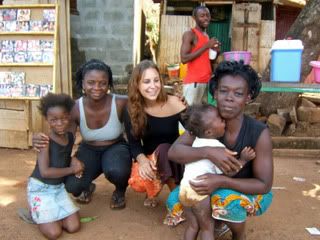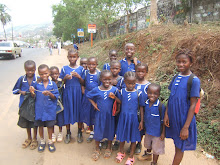I leave for Paris on February 1st. Thankfully I won't be staying there long, only about a week. I already dread it knowing that I will spend emotionally healthy evenings catching up with Eva and Jeanne followed by emotionally, mentally, and physically unhealthy nights of wild parties where I drink too much and crawl home on scraped knees.
I so much prefer the dirt and dust of Africa, the perpetually dirty hair, the 20-pound weight gain from food drenched in palm oil and the mentally stimulating work that no one gives a shit about. In Paris I suffered immensely from the desire to Do Something Good, the reality of doing nothing and having nobody care. Here, at least, I am Doing Something Good even if nobody notices. It's enough for me.
I love my life:
I wake up in the mornings and it's warm and sunny. I don't care that my hair is soaked with sweat, that hiking up my (now-too-small) jeans takes effort against the resistant sweat on my legs. I drink a coffee that is too strong, type on my laptop for hours in the sun and cause permanent sun damage to my aging face. I look utterly like shit, have probably never been less attractive in my life, and feel oddly pleased about it.
I leave the house. My street is a long, unpaved dirt road coloured the brightest shade of orange you've ever seen. Immediately outside the house I have about 4 seconds until the local children run down the hill tripping over themselves yelling, "Helloalloallo!" and come careening headfirst into my knees. They wrap their itty-bitty arms around my legs, smothering them with dirty rice and dust and grime. This week I have been lucky enough to leave the home every day around noon - I have time and am not rushing to meet Charly at the end of the street to grab a ride. When I see the kids coming, yelling their Halloalloallo's I can bend at the knees and outstretch my arms so they have warm hugs to land on instead of knotted knees. This week they have smeared their rice on my arms and back instead of my thighs. I'm not sure what they get out of it, but I love starting my morning with the hugs of these children.
I walk down the orange street wishing goodmorning's to the passers-by who always respond cheerily with bright white smiles against such black skin. The contrast from the frigidity of Paris is astounding. The number of enemies I have here is so minimal! My neighbours say hello! They smile at me! One group in particular, the family who offered me the baby I wrote about earlier, greets me particularly enthusiastically. The mother in question starts the conversation saying, "HELLO GOOD FRIEND!" laughs and points at her daughter - "Look, it's your baby!" she says. I laugh, wish them a good day, politely tell them that I don't want any mangos ("We have good mango! Tell Mike!" they say) and I go off on my way. I have never bought a single mango or orange or banana from this group of people, nor have I agreed to take the baby, but they consistently treat me wonderfully. I walk the rest of the way smiling widely, happy that my upper arms are lined with dirty fingerprints and that somebody greets me as "Good Friend" every day.
These are my friends (including baby!):

At the end of the rocky, dusty, road that I inevitably trip on, there are several rusty shacks full of women and children. The men, I suppose, are at work. The women bathe the children, chase chickens and scrub laundry in rusty buckets. Everyone smiles, saying "Goodmorning, WhiteGirl" and waves. The kids at these homes don't offer hugs - they are shy and discreet in their waving and well-wishing but their smiles are so joyously unrestrained that it's still shocking to me, 60 days later.
When a slumbering, dying taxi rumbles along I get in as if it were a bus, joining the other passengers behind the cracked windshield. I sit in the withered seats, metal poking out from the material at every corner. Hello! Hello! Goodmorning! we all say. The taxi inescapably roars as it moves along even though the vehicle always (always) moves at such a slow pace you swear that it's constantly decelerating. It's not a question of traffic - the cars here are simply the ones you threw out twenty years ago to the junkyard which (you didn't know this - at least, I certainly didn't) were eventually sent to Africa. On the rare occasions that Mike and I get in a car with upholstery, a solid windshield, and no exposed metal parts, we inevitably give one another surprised, wide-eyed glances followed by a "Wow! Nice car!!" Every morning I have conversations with the locals in the taxi about how much I love Sierra Leone, no I am not American, I work for Save the Children, yes, you are my friend too. I get out at King Harmon Road with a wave and respond to the "Ya, good day!" with a "See you back, ya?" and think about how fabulous my life is, sweaty hair, 20-pound weight gain and all.
PS. I had 6 views of this post and a comment AND a "kudos" but then I deleted it to upload the photos and never got to see the comments! Write 'em again!
PPS. Save the Children has such a slow internet connection that uploading the photos that belong to this post is impossible. It will have to wait. Come check back next week!
